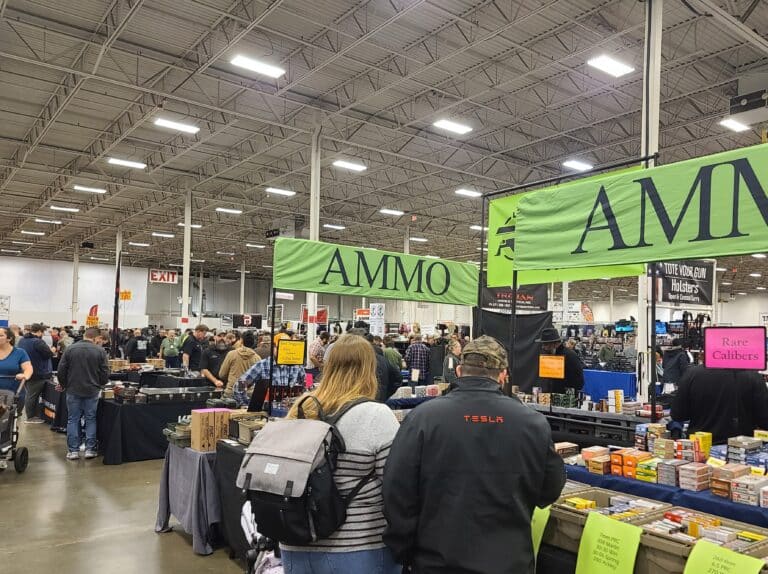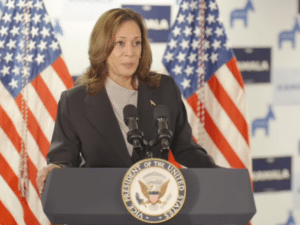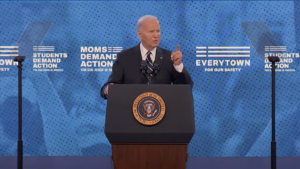The ATF is set to publish a new rule expanding who needs to obtain a federal license before selling firearms on the secondhand market.
On Thursday, President Joe Biden announced the agency submitted its proposed gun dealer licensing rule for publication. The rule formalizes a series of factors the ATF has long contended determine when somebody selling used guns must get a Federal Firearms License (FFL) and adds a few new ones. The President said the changes were designed to force more gun sellers to conduct FBI background checks.
“Today, my Administration is clarifying when folks must get their license and run background checks, and ensuring that gun show and online sale loopholes no longer exist,” Biden posted on social media. “We’re keeping guns out of the hands of abusers and felons.”
The rule casts a broad shadow over private sales across the country. While it doesn’t outlaw sales by those without a license, its vague standards will likely leave many Americans unsure if they can sell their guns without one. The punishment for anyone violating the rules could be up to $250,000 in fines and five years in federal prison or both.
The new standards include considerations like whether somebody is repetitively selling firearms in an effort to turn a profit. It says factors like how quickly somebody resells a gun they’ve bought, whether they repeatedly offer the same kinds of guns for sale, whether they accept credit card payments, keep records of sales, or advertise themselves as a source of firearms sales are key indicators the seller needs a license.
“A person who devotes time, attention, and labor to dealing in firearms as a regular course of trade or business to predominantly earn a profit through the repetitive purchase and resale of firearms,” the rule says.
However, the rule specifically notes there is no hard number of sales that qualify as “repetitive.” Nor is there a specific standard for how much profit is required to trip the license requirement. In fact, the ATF claimed no sales were necessary for somebody to need a license–just the intent to make repeated sales for a profit.
“[T]here is no minimum threshold number of firearms purchased or sold that triggers the licensing requirement. Similarly, there is no minimum number of transactions that determines whether a person is ‘engaged in the business’ of dealing in firearms. For example, even a single firearm transaction or offer to engage in a transaction, when combined with other evidence (e.g., where a person represents to others a willingness and ability to purchase more firearms for resale), may require a license; whereas, a single isolated firearm transaction without such evidence would not require a license. At all times, the determination of whether a person is engaged in the business of dealing in firearms is based on the totality of the circumstances.”
However, the ATF also clarified “a person would not be presumed to be engaged in the business when the person transfers firearms only as bona fide gifts or occasionally sells firearms only to obtain more valuable, desirable, or useful firearms for their personal collection or hobby—unless their conduct also demonstrates a predominant intent to earn a profit.”
The ATF rule is one of a number President Biden has pursued to try and tighten American gun regulations. Due to a lack of support in Congress, he has been unable to pass much of the gun legislation he has pushed for. Instead, he’s turned to enforcing new restrictions through federal rulemaking. However, previous attempts to ban parts kits for homemade guns and pistol-braced AR-15s have faced swift legal backlash and been found unconstitutional by multiple federal courts–though the court fights surrounding them are ongoing.
Unlike the others, the gun dealer licensing rule follows a tweak in language Congress included in the 2022 Bipartisan Safer Communities Act (BSCA). That law changed the definition of who is “engaged in the business” of firearms dealing and, therefore, needs to obtain a license. It removed the requirement that a seller is operating “with the principal objective of livelihood and profit” and replaced it with the requirement they “predominantly earn a profit.”
The ATF contends in the new rule that language change justifies the standards it wants to implement. However, some of the lawmakers who drafted that change disagree.
The Reload contacted every senator who voted for the BSCA. Only two offices responded. Senator John Cornyn (R., Texas), one of the top negotiators of the bipartisan bill, said the language related to gun dealers was meant to be limiting.
“This language is tailored towards individuals regularly selling guns to strangers with the predominant motive of making money through a side business, like the person who sold the Midland shooter his weapon, and it is drafted in such a way that prosecutors will need to prove specific intent on the part of the unlicensed seller,” Cornyn’s office said.
Republican staffers told The Reload the language change was meant to bring the statute in line with how the courts have long interpreted the law. Federal cases going back to the 1970s, such as United States v. Gross, United States v. Huffman, and United States v. Wilkening, show people being convicted of dealing without a license under similar circumstances outlined in the new rule. According to the judges in those cases, an individual may be required to obtain a Federal Firearms License (FFL) if they repeatedly buy and sell a significant number of guns within a short period of time for profit or other financial gain. It’s not necessary for the sales to represent the seller’s primary source of income or even a considerable amount of profit. Wilkening, for example, made just $350 in his 1973 case.
Still, Senator Joni Ernst (R., Iowa) said the rule moved beyond the language change she voted for.
“President Biden is twisting the law to fit his liberal gun-grabbing agenda,” her office told The Reload. “His administration’s latest attack on lawful gun owners clearly oversteps both the intent and the text of the law, at the expense of the average gun seller. Senator Ernst has repeatedly defended FFL holders and will continue to stand up against the Biden administration’s attack on Second Amendment rights.”
Cornyn’s office called it unconstitutional.
“The Biden admin should expect for this rule to be struck down because it is unconstitutional,” they said.
However, President Biden himself said the rule doesn’t go as far as he would like. He urged Congress to force all used gun sales to be done through licensed dealers.
“Congress needs to finish the job and pass universal background checks now,” Biden said.
The rule will go into effect in 30 days.






